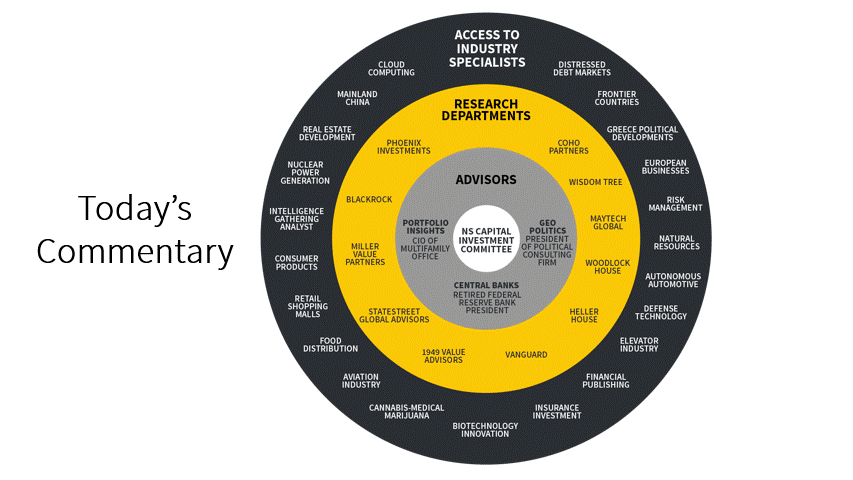NS Capital has created a research network that gives us access to one-on-one expertise on a global scale. Better Information = Better Decisions!

We have been fortunate to build an advisory relationship with a former Federal Reserve Bank President. It has been invaluable to get the perspective from someone that has “been in the room.” Below are key highlights from our conversations conducted on:
February 13, 2020, March 20, 2020, and May 20, 2020
Were you surprised by the extent of the Federal Reserve’s actions?
No, I was not surprised due the power of the negative shock. The Federal Reserve needed to be aggressive. The Federal Reserve did not want a repeat of the 1930s. They decided to do anything in their powers to avoid a depression. The pandemic is much bigger…and broader…than the banking crisis in 2008/2009. The Federal Reserve was created to provide liquidity in large amounts and to prevent bank runs.
Are you concerned the Federal Reserve has gone too far?
Yes, on a few of the initiatives. Cutting interest rates to near zero in early and mid-March made sense. It was a good defensive move. It is the purchase of high yield bonds (and exchange-traded funds) and state & local municipal bonds that is more troubling. The Federal Reserve programs are intended to be paid back but companies with high yield bonds are not investment grade, meaning there is a reasonable chance they will not be able to make payment. Regarding state and local municipal bonds, this inadvertently enters the Federal Reserve into the political arena, bringing the bank’s independence into question. What type of precedent does this set for future crises. That is the key consideration to watch.
Are you comfortable with Chairman Powell’s leadership?
Yes, he is a good person to have in the job right now. He has no ego. He will listen to all perspectives, distill them, and make the best practical decisions. He is particularly attuned to the downside risks and will continue to monitor them closely. I am good with him in the top position.
Are the equity markets becoming dependent on Federal Reserve actions?
It is becoming increasingly expected. Backstopping state & local governments, high yield bonds, and the Main Street Program (companies with 10,000 to 25,000 employees) are far out there for the central bank. The big question is how to the withdrawal this support. It will be hard to return to the conservative nature of the past.
Do you feel the Federal Reserve has stabilized the investment grade bond market?
Yes, it appears so. And, they cannot walk back support of the short-term investment grade corporate bond market. I believe Chairman Powell views this as a necessary area to support.
Higher probability of low interest rates or an inflation surprise over the next 2 to 3 years?
I would expect low interest rates, but it is not a 100% certainty. I (and the current Federal Reserve members) think in probabilities and percentages. Should a vaccine be discovered in the near-term, the stock markets would skyrocket, cash comes off the sidelines and is employed/spent and this creates an environment for rapid inflation. I put this at a 5 to 10% chance.
What is your view of the transition from Draghi to Lagarde at the European Central Bank?
Mario Draghi did a good job during extremely difficult times. Europe is not unified like the USA which makes the execution of monetary policy much more difficult. He stated that he would do whatever was necessary to combat deflation and he accomplished his goal.
Christine Lagarde is a well-respected individual and a good public servant. She did a good job at the IMF but that was a less rigorous post when compared to the ECB. She does not have the deep economic background of Draghi (he went to MIT and was classmate of Bernanke) but is well-connected and will be able to get lots of assistance. She was a good choice.
Any Concluding Thoughts?
On the social balance sheet, confidence is an asset. Social dislocation is serious. All institutions need to come to the table and do the right thing. It is important to maintain confidence of the population at large. I believe this has and will continue to be a priority of the Federal Reserve.
